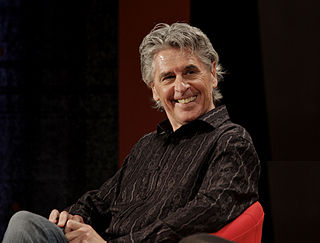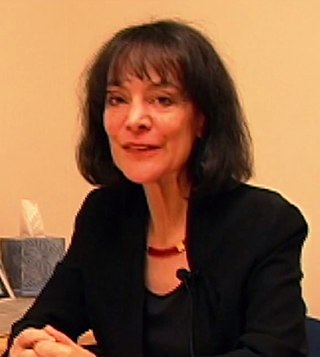A mindset is an established set of attitudes of a person or group concerning culture, values, philosophy, frame of mind, outlook, and disposition. It may also arise from a person's worldview or beliefs about the meaning of life.

Keith James Devlin is a British mathematician and popular science writer. Since 1987 he has lived in the United States. He has dual British-American citizenship.
Founded in 1920, The National Council of Teachers of Mathematics (NCTM) is a professional organization for schoolteachers of mathematics in the United States. One of its goals is to improve the standards of mathematics in education. NCTM holds annual national and regional conferences for teachers and publishes five journals.

The California Department of Education is an agency within the government of California that oversees public education.

Core-Plus Mathematics is a high school mathematics program consisting of a four-year series of print and digital student textbooks and supporting materials for teachers, developed by the Core-Plus Mathematics Project (CPMP) at Western Michigan University, with funding from the National Science Foundation. Development of the program started in 1992. The first edition, entitled Contemporary Mathematics in Context: A Unified Approach, was completed in 1995. The third edition, entitled Core-Plus Mathematics: Contemporary Mathematics in Context, was published by McGraw-Hill Education in 2015.
Sandra Stotsky is Professor emerita in the Department of Education Reform at the University of Arkansas, and held the 21st Century Chair in Teacher Quality. Her research ranges from teacher licensure tests, e.g., (1), coherence in the literature and reading curriculum, e.g., (2), and academic achievement in single-sex classrooms, e.g., (3) to critiques of Common Core’s standards in English language arts, e.g., (4) mathematics.(5), and US History and civic education (6), and other aspects of the Common Core project, e.g., (7), and to reviews of books in education, e.g., (8) She is an advocate of standards-based reform and strong academic standards and assessments for students and teachers.
The Interactive Mathematics Program (IMP) is a four-year, problem-based mathematics curriculum for high schools. It was one of several curricula funded by the National Science Foundation and designed around the 1989 National Council of Teachers of Mathematics (NCTM) standards. The IMP books were authored by Dan Fendel and Diane Resek, professors of mathematics at San Francisco State University, and by Lynne Alper and Sherry Fraser. IMP was published by Key Curriculum Press in 1997 and sold in 2012 to It's About Time.
Integrated mathematics is the term used in the United States to describe the style of mathematics education which integrates many topics or strands of mathematics throughout each year of secondary school. Each math course in secondary school covers topics in algebra, geometry, trigonometry and functions. Nearly all countries throughout the world, except the United States, normally follow this type of integrated curriculum.
Math wars is the debate over modern mathematics education, textbooks and curricula in the United States that was triggered by the publication in 1989 of the Curriculum and Evaluation Standards for School Mathematics by the National Council of Teachers of Mathematics (NCTM) and subsequent development and widespread adoption of a new generation of mathematics curricula inspired by these standards.
Reform mathematics is an approach to mathematics education, particularly in North America. It is based on principles explained in 1989 by the National Council of Teachers of Mathematics (NCTM). The NCTM document Curriculum and Evaluation Standards for School Mathematics (CESSM) set forth a vision for K–12 mathematics education in the United States and Canada. The CESSM recommendations were adopted by many local- and federal-level education agencies during the 1990s. In 2000, the NCTM revised its CESSM with the publication of Principles and Standards for School Mathematics (PSSM). Like those in the first publication, the updated recommendations became the basis for many states' mathematics standards, and the method in textbooks developed by many federally-funded projects. The CESSM de-emphasised manual arithmetic in favor of students developing their own conceptual thinking and problem solving. The PSSM presents a more balanced view, but still has the same emphases.
In the United States and Canada, a school of education is a division within a university that is devoted to scholarship in the field of education, which is an interdisciplinary branch of the social sciences encompassing sociology, psychology, linguistics, economics, political science, public policy, history, and others, all applied to the topic of elementary, secondary, and post-secondary education. The U.S. has 1,206 schools, colleges and departments of education and they exist in 78 per cent of all universities and colleges. According to the National Center for Education Statistics, 176,572 individuals were conferred master's degrees in education by degree-granting institutions in the United States in 2006–2007. The number of master's degrees conferred has grown immensely since the 1990s and accounts for one of the discipline areas that awards the highest number of master's degrees in the United States.

Carol Susan Dweck is an American psychologist. She holds the Lewis and Virginia Eaton Professorship of Psychology at Stanford University. Dweck is known for her work on motivation and mindset. She was on the faculty at the University of Illinois, Harvard, and Columbia before joining the Stanford University faculty in 2004. She was named an Association for Psychological Science (APS) James McKeen Cattell Fellow in 2013, an APS Mentor Awardee in 2019, and an APS William James Fellow in 2020, and has been a member of the National Academy of Sciences since 2012.
The Common Core State Standards Initiative, also known as simply Common Core, was a multi-state educational initiative begun in 2010 with the goal of increasing consistency across state standards, or what K–12 students throughout the United States should know in English language arts and mathematics at the conclusion of each school grade. The initiative was sponsored by the National Governors Association and the Council of Chief State School Officers.
Miriam G. Sherin is a professor in the School of Education and Social Policy and the Learning Sciences Department at Northwestern University. Her areas of research include mathematics teaching and learning, teacher cognition, and teacher education. Sherin has published articles in Journal of Teacher Education, Teaching and Teacher Education, and Journal of Mathematics Teacher Education. Her most recent book, Mathematics Teacher Noticing: Seeing Through Teachers' Eyes, was publish in 2011 by Taylor & Francis. Since 2018 she has been associate provost for undergraduate education at Northwestern University. She is the sister of sociology scholar Adam Gamoran, currently president of the William T. Grant Foundation.
Paul Charles Rosenbloom was an American mathematician.

Ralph Louis Cohen is an American mathematician, specializing in algebraic topology and differential topology.
Michelle Ann Manes is an American mathematician whose research interests span the fields of number theory, algebraic geometry, and dynamical systems. She is a professor of mathematics at the University of Hawaii at Manoa, and has been a program director for algebra and number theory at the National Science Foundation.

Jelani Osei Nelson is an Ethiopian-American Professor of Electrical Engineering and Computer Sciences at the University of California, Berkeley. He won the 2014 Presidential Early Career Award for Scientists and Engineers. Nelson is the creator of AddisCoder, a computer science summer program for Ethiopian high school students in Addis Ababa.
Elham Kazemi is a mathematics educator and educational psychologist, the Geda and Phil Condit Professor in Math and Science Education in the College of Education of the University of Washington.
Richard James Milgram is an American mathematician, specializing in algebraic topology. He is the son of mathematician Arthur Milgram.






